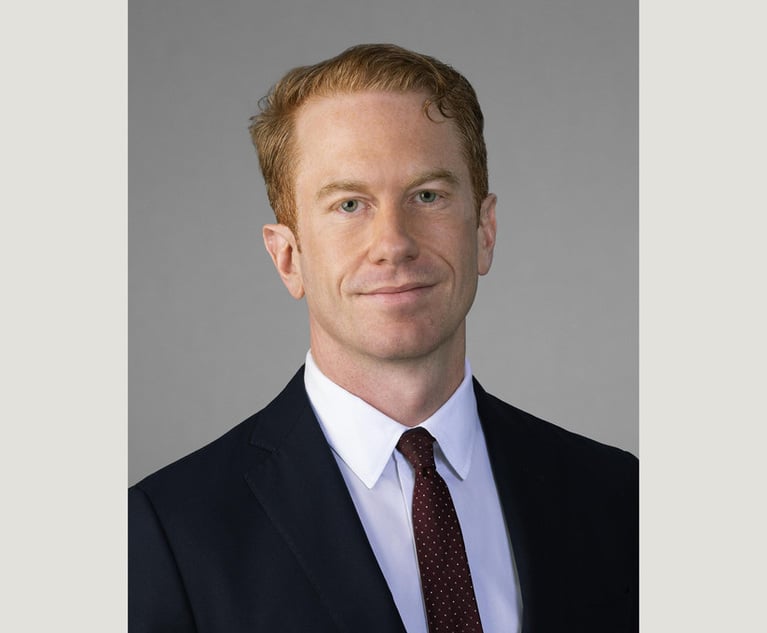Not Everyone Cheers Kirkland's Move to End Associate Arbitration Policy
As more firms bow to pressure to abandon mandatory arbitration provisions, some observers warn of unintended consequences for young lawyers.
November 27, 2018 at 09:58 AM
4 minute read
 (Photo: Bigstock)
(Photo: Bigstock)
Even the world's richest law firm can't ignore a hashtag these days—especially one that threatens to limit its access to top talent.
Kirkland & Ellis gave critics of mandatory arbitration provisions a reason to be grateful just before the Thanksgiving holiday, when the country's top-grossing firm announced it would no longer require associates and summer associates to sign mandatory arbitration provisions to work there.
In making its decision, Kirkland was bowing to a nearly two-week campaign organized by a Harvard Law School student group, The Pipeline Parity Project. The campaign, which adopted the hashtag #DumpKirkland, encouraged law students to boycott the firm during the upcoming summer associate recruiting season unless it nixed the arbitration clauses from its employment contracts.
“With this email, Kirkland reversed a 10-year-old policy of requiring attorneys to waive their rights to sue over harassment, discrimination, and other workplaces abuses—a policy that the firm maintained despite widespread scrutiny,” read a statement from the Pipeline Parity Project after the firm's decision.
Kirkland declined to comment on its move other than to say it “periodically reviews firm policies to ensure that they reflect best practices in the legal marketplace,” But there's no doubt the firm was eager to quell the attention generated by the Harvard campaign.
“[Kirkland] may have concluded that negative publicity of not having talented law students apply for positions at the firm outweighed the concern of an arbitration provision that provides confidentiality and privacy to both parties,” said A. Michael Weber, a labor and employment partner at Littler Mendelson in New York.
“I think that's a reasonable concern that a law firm like Kirkland might have, and others might follow for the same reason,” he predicted.
But Weber maintains that arbitration provisions can be useful to both parties, and he cautioned against the industry giving up on them.
There are advantages to associates when it comes to the confidentiality that arbitration can provide, Weber said. Public disputes can be harmful to both parties, and the privacy of an arbitration proceeding can be a very powerful benefit, he added—especially to younger lawyers who want to build their careers without having their names tied to past litigation.
“I would put this in the category of be careful what you ask for,” Weber said.
In the wake of the #MeToo movement, the use of mandatory arbitration provisions within law firms began to draw significant scrutiny, with critics suggesting the clauses can lead to sexual harassment and gender discrimination claims being swept under the carpet.
Earlier this year, Munger, Tolles & Olson announced that it would no longer require its employees or associates to sign mandatory arbitration agreements after a copy of its contract for summer associates that contained such a provision emerged on Twitter. Orrick, Herrington & Sutcliffe and Skadden, Arps, Slate, Meagher & Flom soon ended their policies as well.
Despite the misgivings of people like Weber—and Sacramento-based Orrick employment law partner Julie Totten, who complained in May that “arbitrations are getting a bad rap”—many enthusiastically applauded Munger and Kirkland's choice to abandon their policies.
“I think the students should be applauded, first of all for understanding the power they have and using it in a way that impacts not just them and their particular futures but the futures of all students and lawyers,” said Noah Lebowitz, an employee rights litigator in Berkeley, California, who is currently representing former Winston & Strawn partner Constance Ramos in her gender bias suit against the firm.
Earlier this month, a California appeals court reversed a decision that would have forced Ramos' lawsuit into arbitration. With the court finding the firm's mandatory arbitration provision “unconscionable,” Ramos' suit, barring any appeals from the firm, will proceed in court.
“It's really impressive that [the law students] understand the power of the marketplace and market forces in order to effect a change,” Lebowitz said.
READ MORE:
Kirkland & Ellis Drops Mandatory Arbitration for Associates Amid Law Student Boycott
Will Law Firms Bow to Pressure to End Mandatory Arbitration?
New Study Finds Most Law Firms Mum on Mandatory Arbitration for Summer Associates
This content has been archived. It is available through our partners, LexisNexis® and Bloomberg Law.
To view this content, please continue to their sites.
Not a Lexis Subscriber?
Subscribe Now
Not a Bloomberg Law Subscriber?
Subscribe Now
NOT FOR REPRINT
© 2025 ALM Global, LLC, All Rights Reserved. Request academic re-use from www.copyright.com. All other uses, submit a request to [email protected]. For more information visit Asset & Logo Licensing.
You Might Like
View All

What Happens When Lateral Partners’ Guaranteed Compensation Ends?

Latham Adds Former Treasury Department Lawyer for Cross-Border Deal Guidance
2 minute read
Wachtell Partner Leaves to Chair Latham's Liability Management Practice
2 minute readTrending Stories
Who Got The Work
J. Brugh Lower of Gibbons has entered an appearance for industrial equipment supplier Devco Corporation in a pending trademark infringement lawsuit. The suit, accusing the defendant of selling knock-off Graco products, was filed Dec. 18 in New Jersey District Court by Rivkin Radler on behalf of Graco Inc. and Graco Minnesota. The case, assigned to U.S. District Judge Zahid N. Quraishi, is 3:24-cv-11294, Graco Inc. et al v. Devco Corporation.
Who Got The Work
Rebecca Maller-Stein and Kent A. Yalowitz of Arnold & Porter Kaye Scholer have entered their appearances for Hanaco Venture Capital and its executives, Lior Prosor and David Frankel, in a pending securities lawsuit. The action, filed on Dec. 24 in New York Southern District Court by Zell, Aron & Co. on behalf of Goldeneye Advisors, accuses the defendants of negligently and fraudulently managing the plaintiff's $1 million investment. The case, assigned to U.S. District Judge Vernon S. Broderick, is 1:24-cv-09918, Goldeneye Advisors, LLC v. Hanaco Venture Capital, Ltd. et al.
Who Got The Work
Attorneys from A&O Shearman has stepped in as defense counsel for Toronto-Dominion Bank and other defendants in a pending securities class action. The suit, filed Dec. 11 in New York Southern District Court by Bleichmar Fonti & Auld, accuses the defendants of concealing the bank's 'pervasive' deficiencies in regards to its compliance with the Bank Secrecy Act and the quality of its anti-money laundering controls. The case, assigned to U.S. District Judge Arun Subramanian, is 1:24-cv-09445, Gonzalez v. The Toronto-Dominion Bank et al.
Who Got The Work
Crown Castle International, a Pennsylvania company providing shared communications infrastructure, has turned to Luke D. Wolf of Gordon Rees Scully Mansukhani to fend off a pending breach-of-contract lawsuit. The court action, filed Nov. 25 in Michigan Eastern District Court by Hooper Hathaway PC on behalf of The Town Residences LLC, accuses Crown Castle of failing to transfer approximately $30,000 in utility payments from T-Mobile in breach of a roof-top lease and assignment agreement. The case, assigned to U.S. District Judge Susan K. Declercq, is 2:24-cv-13131, The Town Residences LLC v. T-Mobile US, Inc. et al.
Who Got The Work
Wilfred P. Coronato and Daniel M. Schwartz of McCarter & English have stepped in as defense counsel to Electrolux Home Products Inc. in a pending product liability lawsuit. The court action, filed Nov. 26 in New York Eastern District Court by Poulos Lopiccolo PC and Nagel Rice LLP on behalf of David Stern, alleges that the defendant's refrigerators’ drawers and shelving repeatedly break and fall apart within months after purchase. The case, assigned to U.S. District Judge Joan M. Azrack, is 2:24-cv-08204, Stern v. Electrolux Home Products, Inc.
Featured Firms
Law Offices of Gary Martin Hays & Associates, P.C.
(470) 294-1674
Law Offices of Mark E. Salomone
(857) 444-6468
Smith & Hassler
(713) 739-1250










